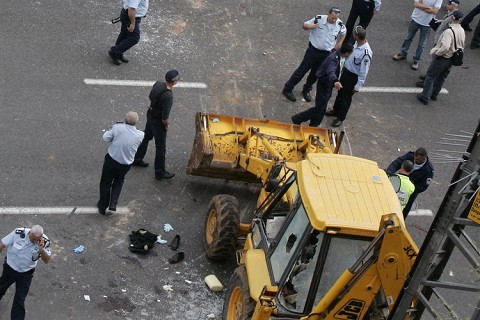"French Logic, Islamic Reality"
[URL no longer valid] is just a sort of cartoon, but the post may have a point.
The "Sear and Hammer" blog has an intriguing definition in its header: "
Hoplophobia (n) - mental disturbance characterized by irrational aversion to weapons."
1
The post's picture is a speech balloon with a quote, "
Security is the responsibility of the state. I am against the private ownership of firearms. If you are assaulted by an armed burglar, he will use his weapon more effectively than you anyway, so you are risking your life." The speaker is a photo of French president Nikolas Sarkozy. The background image shows a street scene that could have been taken in the Middle East. (The photo was probably taken in one of the French cities where young Muslims have been expressing their feelings about French wisdom and policies in a crudely physical manner.)
The caption reads, "So...how's that working for you folks?"
How Not to End a War
This reminds me of European leaders' reaction to World Wars I and II. After "
the war to
end all wars," European leaders pondered how to prevent another conflict. Pooling their wisdom, they decided that the war happened because
- They'd had weapons
- They were developing more weapons
- And it was Germany's fault
So, the assembled luminaries at Versailles arranged punishments for Germany, and assurances that the civilized countries in Europe wouldn't have too many weapons.
Yes, I'm over-simplifying. A lot.
However, I think it's arguable that the Versailles party helped Germany's National Socialist party rise to power, by giving the German people something to be legitimately offended at. On top of that, the peace-loving nations of Europe now didn't have the military power to effectively negotiate with a Germany that wasn't quite so scrupulous about treaty obligations.
So, we got WWII.
'War to End All Wars' Number Two: Lessons Learned?
I'll give European leaders credit. After the Second World War,
- They formed NATO, a blatantly military alliance
- Germany got better treatment than after WWI - the half that wasn't given to the former Soviet Union, at least
- Japan wasn't treated too badly
Some of Japan's international help, a great deal of it from America, was admittedly intrusive. However, the intent was to get Japan re-built and on its feet. Since Japanese industries have been very serious competitors with American and European businesses, from Toyota to Nintendo, it seems that the efforts were successful.
Spirit of Versailles: Still Here
Back in Europe, though, I'd say that the spirit of Versailles is still alive and well in Europe. A plausible explanation for Europe's pervasive negotiate - and - conciliate preference is that the people of Europe got two horrible shocks, a generation apart, and so want to avoid armed conflict at any cost.
Besides, it feels so much nobler to plea for peace and hand out Nobel Peace Prizes, than to engage in the sort of rough and destructive military action that's occasionally necessary when dealing with leaders who are willing to kill and destroy.
Compromise: But Not Always
I don't see myself as a "hawk," politically.
I would very much prefer that conflicts be resolved by all parties sitting down and discussing - calmly, if possible - their differences. That way, a mutually acceptable compromise may be reached.
I've also studied enough history to realize that sometimes compromise isn't the best approach. The people who put the United States of America together in the aftermath of their revolution compromised on the issue of slavery. It took the suppression of another revolution, a century later, to settle the issue.
England's Prime Minister Chamberlain is best-known for his notorious compromise at that Munich meeting in 1938. The peace he won lasted a couple of days. Or, five and a half months,
depending on which event you choose as the end of Chamberlain's peace: Germany
- Entering the Sudetenland on October 1, 1938
- Invading the remainder of Czechoslovakia, March 15, 1339
Back to the point of this post.
First, a couple of fairly obvious points
- Peace is nice. It would be nice if everyone would agree to settle differences peacefully.
- War isn't nice. Things get broken and people die. This is not good.
- Diplomacy can lead to mutually-acceptable compromise. This is good.
Second, it's hard to shake the impression that America and Europe have leaders and 'experts' who are afraid of weapons. Not sensibly cautious about getting shot by a tanked-up hunter or enthusiastic mugger: being afraid that the guns will shoot them.
Misplaced or exaggerated fear can make people do and write odd things. Palestinian 'activists' have a history of demanding a cease-fire when Israeli forces are hurting them. Then, after they've had a chance to resupply and regroup, it's back to "Death to Israel!"
This week, Hamas asked Israel to stop attacking terrorists. I think we can count on more headlines like "
Olmert Rejects Hamas’ Offer of Cease-Fire," with the usual interpretation of unreasonable Jews rejecting peace-loving Palestinians - published by possibly- hoplophobic editors who seem more focused on achieving peace than avoiding genocide. (Yes, I'm biased.)
Third, compromise with others, letting them achieve some of their goals, is important. But sometimes compromise isn't the greatest good.
Finally, compromise with leaders who call for "Death to Israel!" and "
Death to the great Satan America!" seems less than prudent.
1 You're not likely to find "
hoplophobia" on your bookshelf, uless you've got something like "Contemporary Diagnosis And Management of Anxiety Disorders" (Philip T. Ninan, MD, and Boadie W. Dunlop, MD). The idea that fear of weapons is not normal seems to be one that hasn't gained traction among America's best and brightest.

